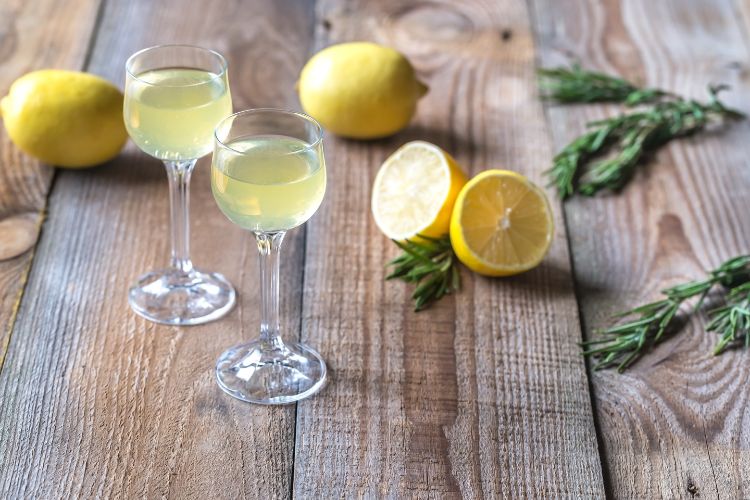Limoncello, that vibrant, zesty elixir, is more than just a liqueur—it’s a celebration of Southern Italy in a bottle. Originating from the sun-drenched terrains of the Amalfi Coast, as well as the idyllic islands of Ischia and Capri, this lemon-infused marvel has been brightening Italian tables for generations, but we’re also aggressively making our own in the US.
Read on to not only learn how to make a classic Limoncello cocktail but also what makes it so special.
ALSO SEE: How to Travel to the Amalfi Coast: Best Wine Tours & Luxury Hotels
The Geography of Flavor
The Amalfi Coast the birthplace of Limoncello. The region’s unique microclimate, enriched by volcanic soil and coastal air, cultivates lemons with an unparalleled aroma and flavor profile. These aren’t your run-of-the-mill supermarket lemons; we’re talking about ‘Sfusato Amalfitano,’ a lemon variety that’s become synonymous with Limoncello itself.
Folklore and Creation Myths About Limoncello
While the exact origins of Limoncello are shrouded in a bit of mystery, several charming tales vie for the title of the “true” Limoncello story. One popular narrative credits Italian fishermen who sipped on Limoncello to ward off the chill and, perhaps, the occasional sea monster. Another story attributes its invention to early 20th-century innkeepers who offered the liqueur to entice and revitalize guests.
RELATED: Easy Negroni Sbagliato with Prosecco Recipe (As Referenced on TikTok)
Cultural Significance
In Italy, Limoncello is a cherished tradition. Often homemade, it’s a staple in Italian households, especially in the south. It’s the liqueur of choice for toasting to good health at family gatherings, and it’s a symbol of Italian hospitality. Offering a glass of Limoncello to guests is akin to welcoming them into your home with open arms.
The Lemon (or Lime depending where you live): The Star Ingredient in Limoncello
When it comes to crafting an exceptional Limoncello, the lemon isn’t just an ingredient; it’s the cornerstone of the entire endeavor. The quality of your lemons can make or break your Limoncello, so let’s talk specifics.
The Imperative of Quality
First and foremost, high-quality, organic lemons are non-negotiable. Organic lemons are free from pesticides and other chemicals that can compromise both flavor and aroma. High-quality lemons (for you South Americans, we’re talking limes) and they have a more vibrant color and robust skin, which are crucial for extracting the essential oils that give Limoncello its characteristic zest.
What is the Best Alcohol Base for Limoncello?
While vodka’s neutrality often makes it the go-to choice for beginners, purists might argue in favor of Everclear or another high-proof grain alcohol. The latter brings an authentic kick and extracts lemon oils more efficiently, but it can also introduce a harshness that’s not everyone’s cup of tea—or shot of Limoncello, as it were. The takeaway? Your choice of alcohol can be a personal signature, a subtle nuance that distinguishes your Limoncello from the rest.
What Are the Health Benefits of Limoncello?
Let’s be clear: Limoncello is no health elixir, but that doesn’t mean it’s devoid of any nutritional virtues. The lemons bring a burst of Vitamin C and a host of antioxidants to the table. Some studies even suggest that lemon peel contains compounds that have anti-cancer properties. So, while the alcohol content certainly disqualifies Limoncello from being a wellness drink, sipping it in moderation could offer some minor health perks, making that toast to “Salute!” a bit more meaningful.
How to Pair Limoncello with Food?
Limoncello’s culinary versatility is often overshadowed by its standalone allure. Yet, this liqueur can be a culinary revelation when paired thoughtfully. Imagine a drizzle of Limoncello over a fresh fruit salad, its citrus notes elevating each bite.
Or consider it as a surprising companion to seafood dishes, where its acidity cuts through the richness like a well-aimed zing of lemon. The point is, Limoncello isn’t just an after-dinner sip; it’s a dynamic component that can elevate an entire meal.
What Are Some Variations of Limoncello?
Before we get into the classic Homemade Limoncello Recipe below, why stop there? The world of fruit-infused liqueurs is ripe for exploration. Take Arancello, for instance, where the robust zest of oranges takes center stage, offering a sweeter, more rounded flavor profile.
Or venture into the exotic with Meloncello, a melon-based variant that’s like a sip of summer in a bottle. These variations aren’t just Limoncello’s distant cousins; they’re a testament to the endless creativity that this Italian tradition inspires. So go ahead, experiment and make the Limoncello family a little larger.
Homemade Limoncello Recipe
Ok, it’s time. And yes, this Limoncello recipe requires time. It’s not a cocktail you make in the moment. This is a true craft. Making a real Limoncello to serve to your guests requires attention, patience and above all, amore.

Homemade Limoncello Recipe
Equipment
- 1 Large glass jar with a tight-fitting lid At least 1-liter capacity
- 1 Microplane or fine grater
- 1 Cheesecloth or fine mesh strainer
- 1 Funnel
- 6 Small glass bottles for storing Limoncello
- 1 Measuring cup
- 1 Saucepan
Ingredients
- 6 Units 'Sfusato Amalfitano' lemons (or high-quality, organic lemons)
- 1 750ml (Bottle) Vodka (80% proof) High-proof vodka or grain alcohol will work depending on desired outcome
- 1 Cup Granulated sugar
- 1 Cup Water
Instructions
- Preparation: Wash the lemons thoroughly to remove any dirt or impurities.
- Zesting: Use a microplane or fine grater to zest the lemons, taking care to only remove the outer yellow layer and avoiding the white pith.
- Infusion: Place the lemon zest in the large glass jar and pour the high-proof vodka or grain alcohol over it. Seal the jar tightly.
- Steeping: Allow the mixture to steep in a cool, dark place for at least one week, shaking the jar gently every couple of days.
- Sugar Syrup: In a saucepan, combine the sugar and water. Heat over low heat until the sugar dissolves completely. Allow the syrup to cool to room temperature.
- Combining: Once the alcohol has steeped, strain it through a cheesecloth or fine mesh strainer to remove the lemon zest. Combine it with the cooled sugar syrup in a large container.
- Bottling: Use a funnel to pour the finished Limoncello into small glass bottles, sealing them tightly.
- Final Touch: For best results, allow the Limoncello to age for at least another week in a cool, dark place before enjoying.
How Should Limoncello Be Stored?
Ah, so now you’ve spent weeks patiently crafting your Limoncello, and now it’s time to savor it—or store it. Proper storage is the unsung hero of Limoncello longevity. While it’s tempting to display that beautiful bottle on your bar cart, your freezer is where it truly belongs. The cold not only enhances its refreshing qualities but also preserves its vibrant lemony essence. And while Limoncello doesn’t exactly spoil, its flavors can diminish over time, so consider it at its prime for up to a year when stored correctly.
